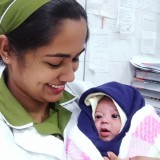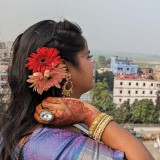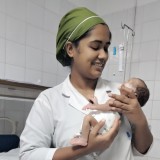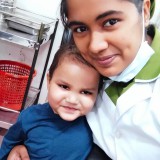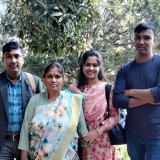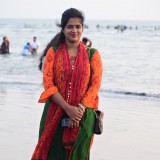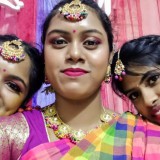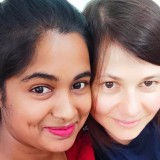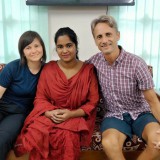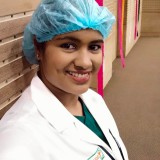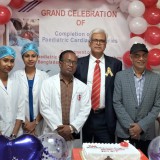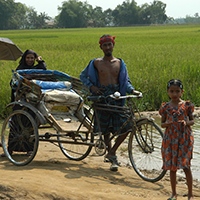Pinky: To Heal or To Make Money?
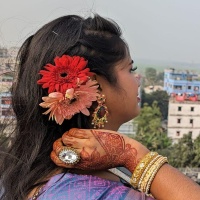
The 28-year-old Pinky remains a cheerful and unmistakable nurse with a bachelor's degree. She works in the pediatric department of a semi-state hospital in the Bangladeshi capital, Dhaka. The journey to this profession was not straightforward; her mother and the donor program BanglaKids played a crucial role.
My mother dreamed about it
It was actually her mother's unfulfilled dream to become a nurse that inspired her to embark on the journey of caring for little patients. Pinky's mother, a cook at a small hostel, supported her in every possible way during her studies.
After graduating, Pinky joined a three-year nursing program at a vocational school, culminating in the attainment of her diploma. This was followed by a two-year post-study, a prerequisite for admission to a university, and a three-year bachelor's degree, which Pinky also successfully completed.
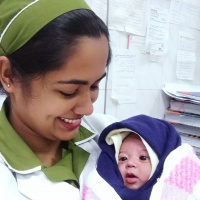 However, it wasn't easy, both financially and academically. The costs of studying at the Universal Nursing Institute were 20,000 taka per semester (approximately 166 EUR at that time), plus 6,000 taka per month (about 50 EUR) for necessary expenses such as food, accommodation, and textbooks. Pinky's mother had to incur debt for Pinky's education, but, to our joy, a donor from the BanglaKids program in the Czech Republic also provided assistance.
However, it wasn't easy, both financially and academically. The costs of studying at the Universal Nursing Institute were 20,000 taka per semester (approximately 166 EUR at that time), plus 6,000 taka per month (about 50 EUR) for necessary expenses such as food, accommodation, and textbooks. Pinky's mother had to incur debt for Pinky's education, but, to our joy, a donor from the BanglaKids program in the Czech Republic also provided assistance.
Every day, Pinky studied from 8:00 in the morning until 6:00 in the evening—6 hours at school, 3 hours of self-study, and a 1-hour lunch break. In addition, she had hospital duties 3 times a week from 3:00 to 7:00 in the afternoon. She was a persistent student, patiently pursuing her goal. And her hard work truly paid off.
Today, Pinky works as a specialized nurse in the pediatric department in Dhaka, 6 hours a day, 6 days a week. In the semi-state hospital, she earns 27,000 taka (approximately 224 EUR), which is a relatively high salary.
What if you're not a VIP Bangladeshi and you have health problems?
Generally, salaries in Bangladeshi state hospitals are better than in private ones. An exception is the United private hospital network. However, there are significant differences from a patient's perspective. In a state hospital, you may pay around 100 taka/day (approximately 0,83 EUR) for a bed, making it accessible mainly to the poor. In a private hospital, you could pay up to 25,000 taka per day (approximately 207 EUR), not including additional costs associated with treatment and medication. Thus, entrepreneurs and VIP individuals usually seek treatment in private hospitals. In semi-state hospitals, bed costs range from approximately 200 to 700 taka/day (about 1,66–5,80 EUR).
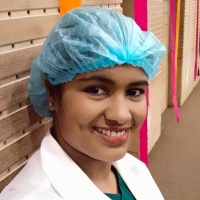 Private hospitals aim for a high standard of care, but patients have to pay for it. State hospitals maintain high standards by requiring qualifications for doctors and nurses, offering better salaries, stability, and even pensions. However, as Pinky says, "There are still differences in patient care. It depends on whether you want to treat people and help the sick or just make money."
Private hospitals aim for a high standard of care, but patients have to pay for it. State hospitals maintain high standards by requiring qualifications for doctors and nurses, offering better salaries, stability, and even pensions. However, as Pinky says, "There are still differences in patient care. It depends on whether you want to treat people and help the sick or just make money."
The issue of favoritism is a problem in Bangladeshi healthcare. If you have a friend or family member in the hospital or you work in the public sector or government, you get priority. Care is faster and of better quality, while the poor have to wait. In serious cases, this approach can have fatal consequences. Pinky comments on the Bangladeshi reality, "On one hand, it's nice to have connections; on the other hand, it's terrible."
Big dreams and a healthcare system for everyone
That's why Pinky wishes for quality healthcare to be accessible to everyone in her country, regardless of status, social standing, or bank account balance. She strongly feels the harsh reality of people on the fringes of society. She wishes the government would financially support the poor, who can't afford medicines or medical care, creating something like a solidarity healthcare system for all.
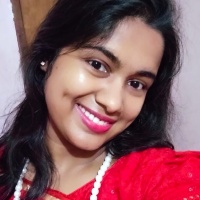 Regarding the future, Pinky continues to dream. She would like to pursue a master's program, which is not as time-consuming as a bachelor's, allowing her to combine work with study. She also wants to get married. On the question of whether it will happen before or after completing her studies, she just smiled mysteriously without giving an answer.
Regarding the future, Pinky continues to dream. She would like to pursue a master's program, which is not as time-consuming as a bachelor's, allowing her to combine work with study. She also wants to get married. On the question of whether it will happen before or after completing her studies, she just smiled mysteriously without giving an answer.
When parents know what education can change
Pinky's family fully understands the value of education. Perhaps it was her father's serious illness that made him unable to work, her mother's positive influence, and an awareness of society's needs that directed her older brothers and Pinky toward healthcare. One brother became a pathologist, the other a manager in the pharmaceutical company Square. And Pinky became a nurse with ambitions for further education.
PS: Pinky's fate was positively influenced by the BanglaKids program and its donors. We thank them for her and all the other Bangladeshi children. 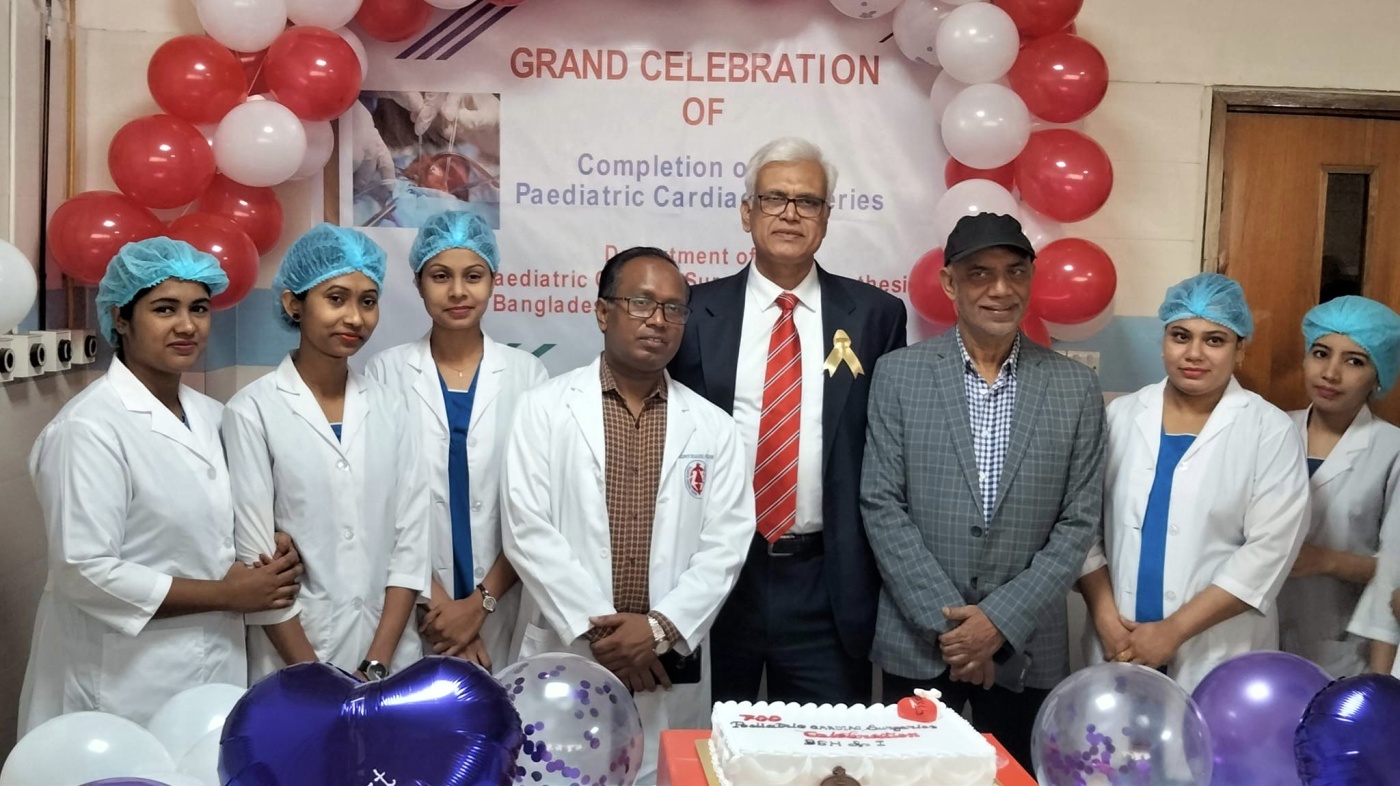 Pinky's message: "It depends on whether you want to treat people and help the sick or just make money."
Pinky's message: "It depends on whether you want to treat people and help the sick or just make money."
